Sales coaching turns good reps into great ones.
If you’re running out of bandwidth and want to aggressively scale your sales coaching capabilities without hiring several sales managers, artificial intelligence (AI) is the answer.
AI sales coaching helps small businesses streamline and deliver consistent training without the time constraints or costs of additional sales managers.
In this article, you’ll learn what AI sales coaching is, how it works and why it’s so powerful. We’ll even review five AI sales coaching tools you can implement today.
What is AI sales coaching?
AI sales coaching analyzes your sales data to deliver personalized training, real-time guidance and performance insights that help reps close more deals.
AI sales coaching tools analyze data to identify each rep’s weak points and create a tailored training playbook. The bespoke nature of these plans can make them more effective and engaging than traditional human-led alternatives.
Human sales coaches struggle to listen to every call reps make, but AI coaching tools can analyze them all instantly. For example, they can pinpoint that a rep struggles to agree on the next steps during most calls and design a bespoke role-playing scenario to fix this.
However, AI tools aren’t a replacement for in-house coaches. Instead, small business owners use them to help sales managers deliver high-quality training to more reps without increasing costs.
Other use cases for AI coaching tools include:
-
Personalized coaching plans. Based on their specific performance data, each rep receives targeted training. For example, if a rep struggles with discovery calls, the AI creates exercises focused on questioning techniques and active listening skills.
-
Role-playing. AI tools simulate sales conversations that align with your sales methodology, letting reps practice proven techniques in risk-free scenarios. Through role-playing exercises, reps master sales methodologies by rehearsing everything from discovery questions to objection handling before engaging with real prospects.
-
Real-time coaching. AI analyzes sales conversations in real time, suggesting proven responses and next steps during crucial moments. For example, when a prospect mentions budget concerns, the tool immediately recommends relevant case studies or ROI data that have worked in similar situations.
AI tools provide real-time feedback by continuously analyzing multiple data points, from call recordings and email responses to deal progression and customer interactions. When a rep masters one skill, such as discovery calls, the AI automatically shifts focus to other areas that require attention, such as proposal follow-up or closing techniques.
When reps master one part of the sales process – capturing relevant information during a discovery call – the AI tool can adjust its recommendations to focus on another part, such as overcoming sales objections.
AI sales coaching vs. sales training
Sales training differs from AI sales coaching in its purpose and timing. AI coaching analyzes live sales conversations and performance data to provide ongoing personalized feedback. Sales training teaches every new rep the same fundamental information during onboarding. You don’t need AI for this initial training because all reps must learn the same basic knowledge.
Training covers topics like:
Small businesses can use workflow automation and bots to walk reps through sales training topics.
Recommended reading
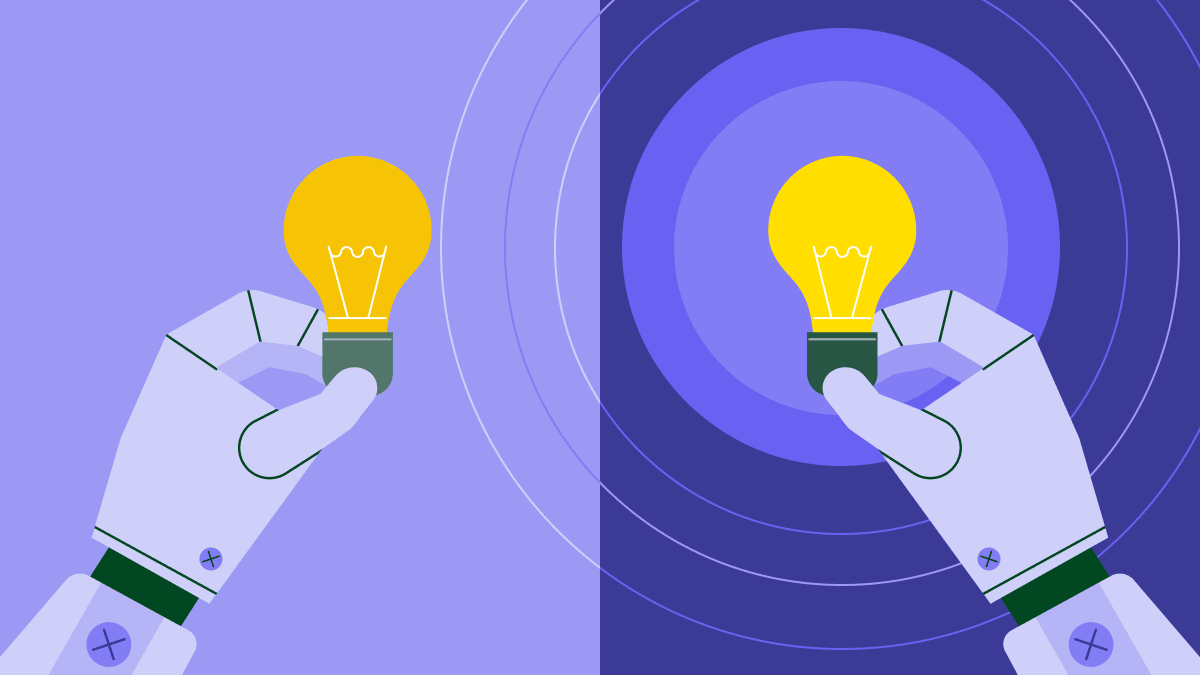
Machine learning vs. deep learning for sales teams
How AI sales coaching works
AI sales coaching platforms use machine learning, natural language processing (NLP) and large language models (LLMs) to analyze team performance and personalize training programs.
Here are the roles of each technology:
|
Machine learning models |
MLMs analyze your sales data to identify successful patterns in winning deals. For example, they can detect which email sequences have the highest response rates or which call techniques lead to the most conversions, helping reps replicate proven strategies. |
|
Natural language processing |
NLP technology analyzes sales conversations to identify successful questioning techniques, measure customer engagement and spot common objection patterns. |
|
Large language models |
LLMs combine machine learning models and natural language processing technology to give sales reps advice through a conversational AI solution. For example, reps can ask LLMs to summarize a recent sales call and suggest next steps. |
AI sales tools combine all three technologies to identify areas for improvement, build personalized training programs and coach sales reps through them.
A generative AI sales coach, like Pipedrive’s Sales Assistant, uses a combination of a large language model and several machine learning models to access and analyze your deals, contacts and emails.
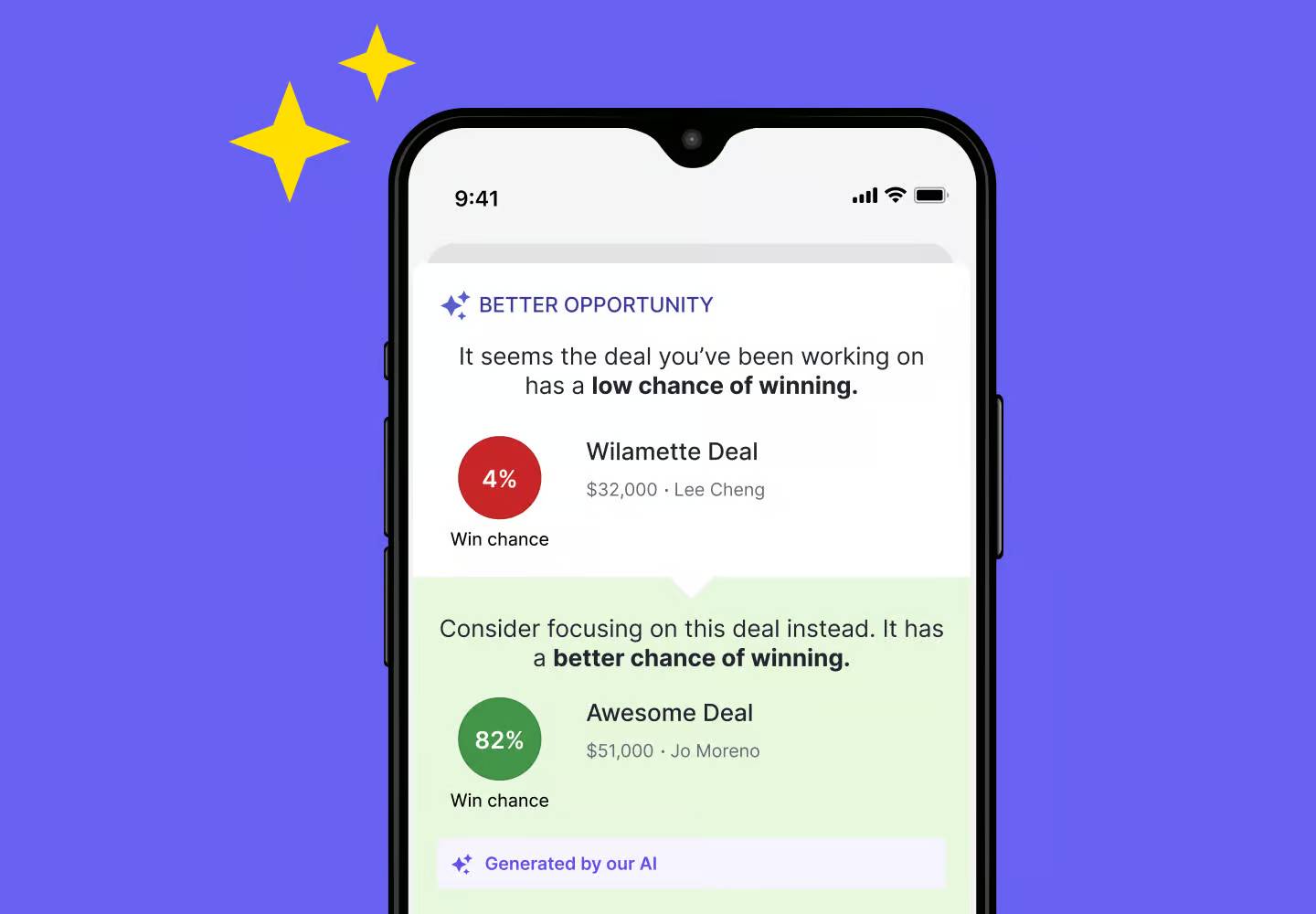
Natural language processing technology understands what reps and prospects say in these emails, allowing the tool’s specific machine learning models to predict things like:
-
How likely a prospect is to close
-
How many deals reps will close in total
-
Which sales strategies work best
-
What sales actions will contribute to a won deal
It’s then back to the overarching LLM to communicate this information to the sales rep through notifications and the tool’s chat interface.
Recommended reading
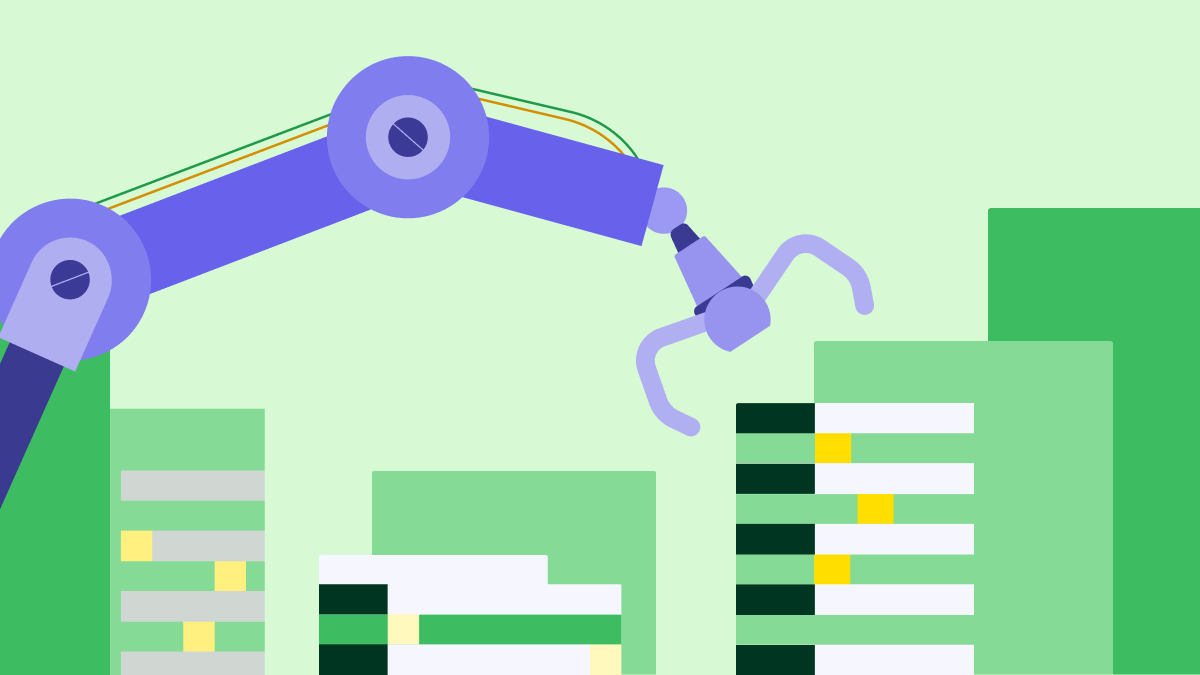
AI vs. IA: How to tell the difference
Five must-try AI sales coaching tools
Various AI sales coaching tools exist, each with unique features and use cases. Here are five must-try software and why they’re great.
1. Pipedrive: best AI sales assistant
Pipedrive’s AI-powered sales assistant helps reps win more deals by highlighting high-intent prospects and suggesting actions, like sending a follow-up email or arranging a demo.
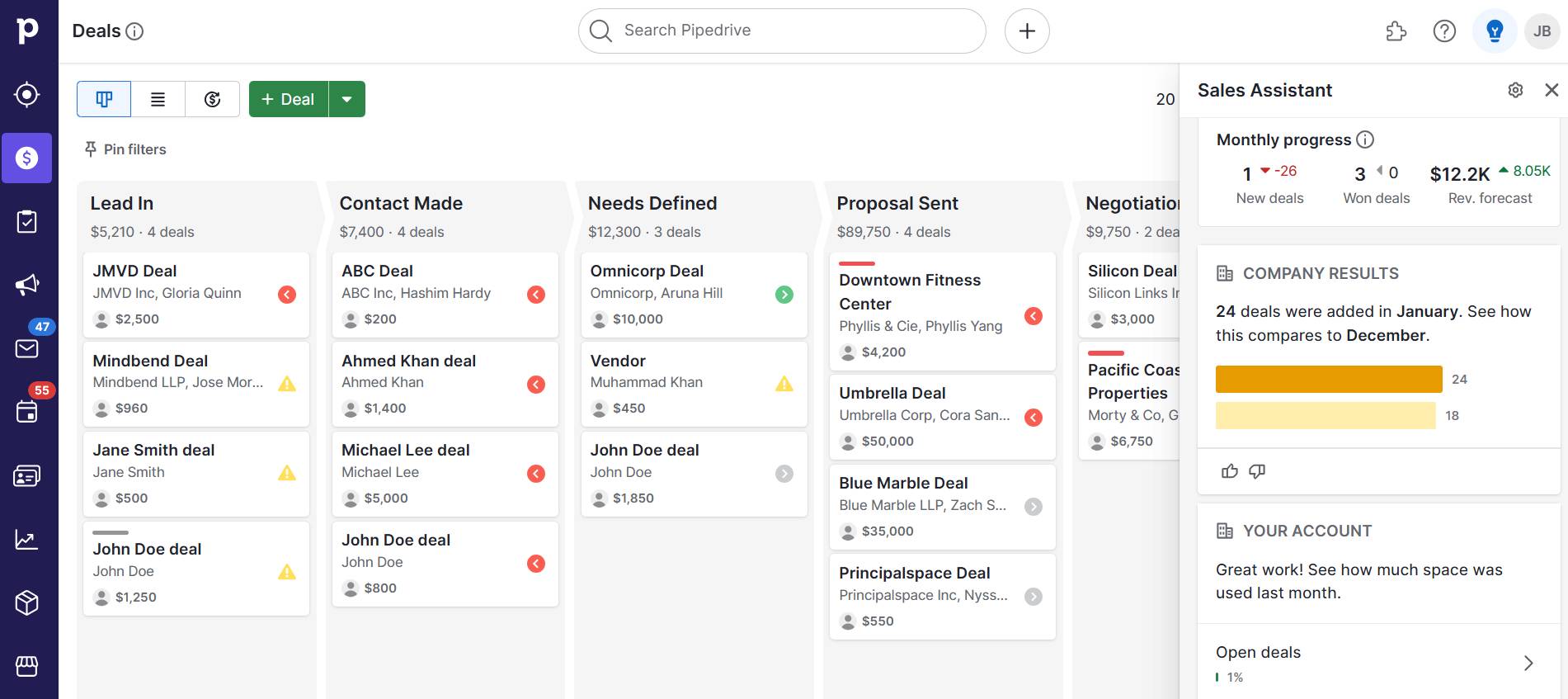
Pipedrive’s AI Sales Assistant analyzes your sales data to automate routine tasks and highlight opportunities. It finds deals with the highest close probability based on your historical data and suggests specific actions to move them forward. The Sales Assistant improves over time, recognizing the distinct sales patterns and preferences and adapting to each rep’s needs.
Key features include:
-
Smart reminders. The Sales Assistant monitors your pipeline and alerts you when deals need attention, such as scheduling the next meeting or following up on a proposal sent.
-
AI email tools. Save hours on email communication with AI that writes customized emails based on your sales context and summarizes long email threads into actionable points.
-
Deal insights. Currently in beta, this OpenAI-powered feature analyzes all interactions in a deal to create quick summaries of key decisions, next steps and potential risks. For example, it can highlight when a prospect mentions budget concerns or shows interest in specific features.
-
Lead qualification. Pipedrive Pulse (currently in beta with waitlist-only access) analyzes email interactions and other sales data to rank leads based on buyer intent so you know which prospects will most likely convert.
Pipedrive integrates with dozens of leading sales tools, including Apollo.io, Snov.io and Intercom. AI-powered app recommendations help you find the best integrations so your business gets the most out of the platform.
Pipedrive’s AI sales assistant is available on its Professional plan, which costs $49 per user per month. There’s also a 14-day free trial.
2. Enthu.AI: best for conversational intelligence
Enthu.AI is an AI coaching platform that analyzes sales calls to provide automated performance scoring, conversation insights and real-time guidance on how to upskill.
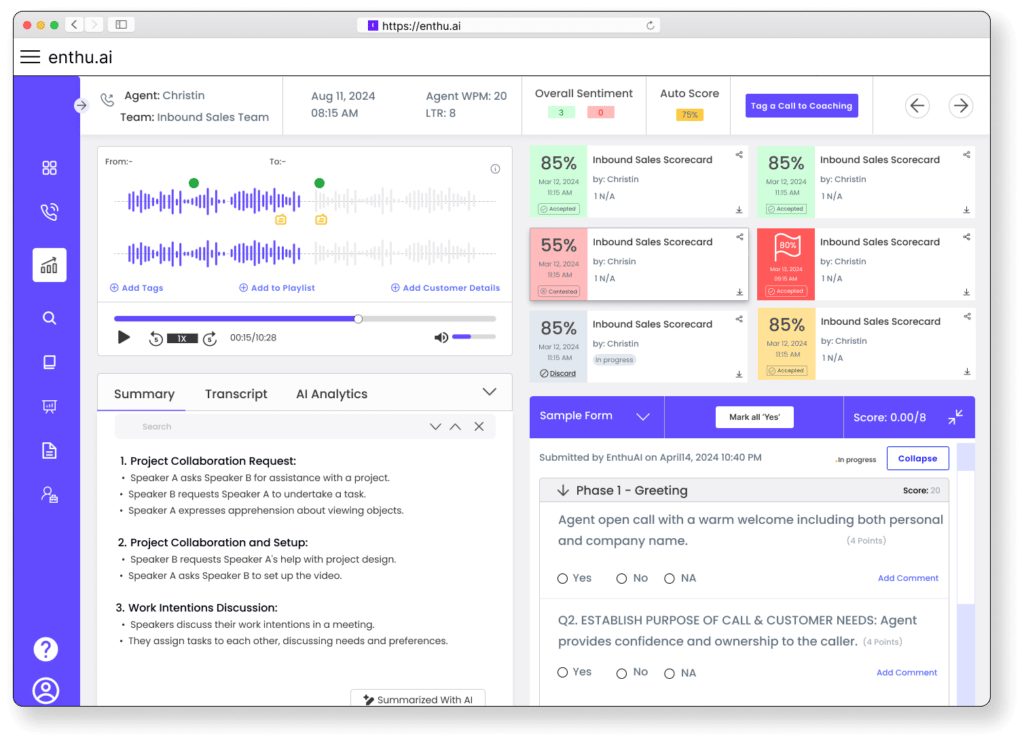
The software automatically records and analyzes every sales call, measuring specific metrics like call duration, conversion rates and common customer objections. It then rates each call out of 100 and grades it based on factors like communication skills, product knowledge and objection handling. This data identifies which sales techniques are most effective and where reps need additional training.
Other features include:
-
Automated call reviews and agent evaluations that save coaches time
-
Sales performance analytics that identify winning sales strategies for you to replicate
-
AI summaries that deliver actionable takeaways from call recordings
Enthu.AI connects with many sales tools, including RingCentral, Dialpad and Aircall.
Pricing is available on request. There’s also a 14-day free trial of the tool’s AI features.
3. MeetRecord: best for personalized feedback
MeetRecord is an AI revenue intelligence platform with a powerful and automated coaching feature. It analyzes every customer interaction and calculates key performance indicators like call duration, question rate, empathy and emotion to uncover each rep’s strengths and weaknesses.
The website claims to save salespeople 15 hours per week.
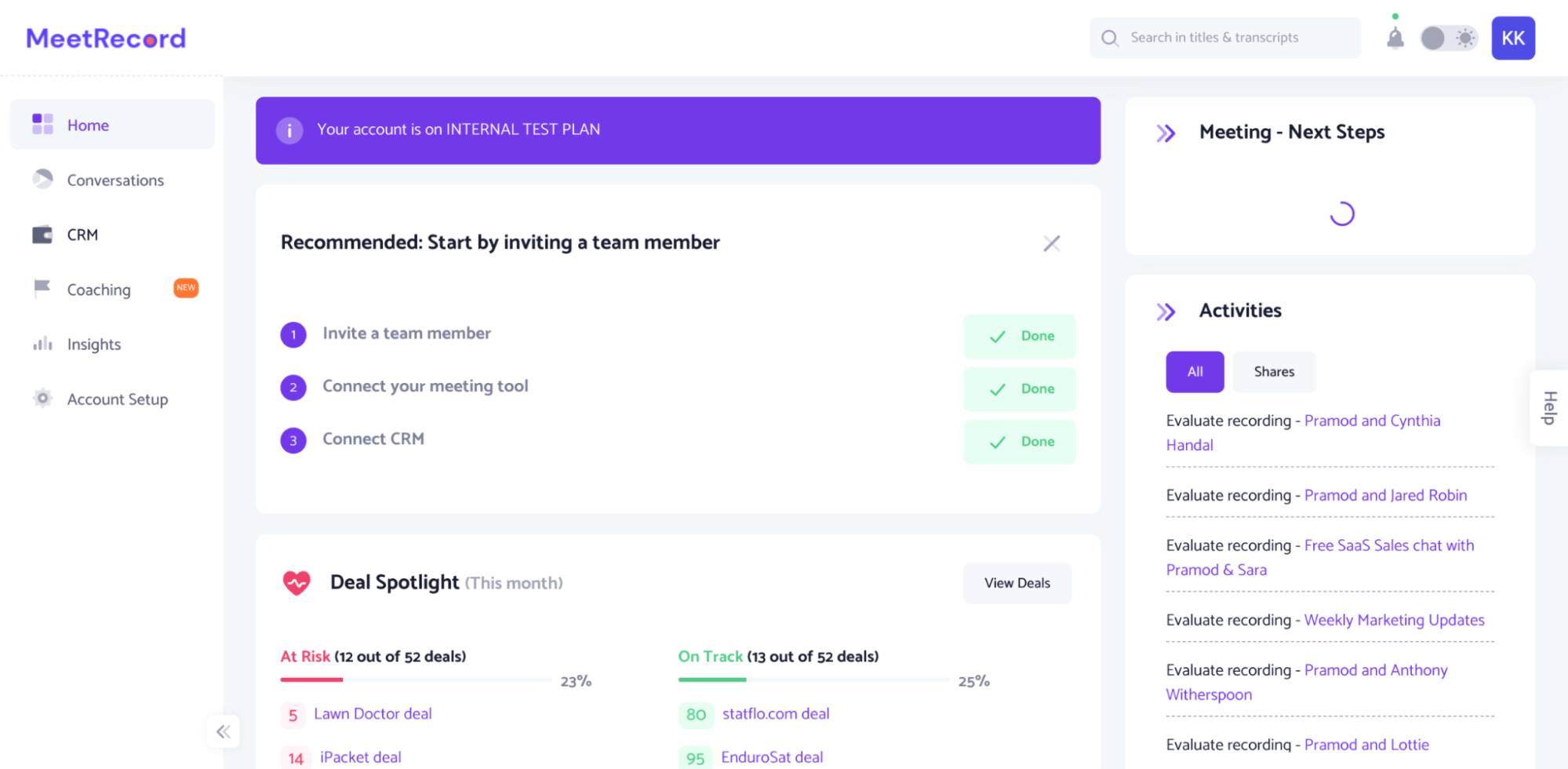
Reps receive personalized feedback immediately after each call. The feedback includes scores based on pre-defined criteria (e.g., script adherence, keyword usage and call quality) and a list of strengths and suggestions for improvement.
Other features include:
-
Automated call monitoring that analyzes and scores every conversation based on predefined KPIs, like script adherence and customer sentiment
-
Performance analytics that generates detailed reports on individual and team behaviors, highlighting successful sales techniques to replicate
-
AI-powered coaching that provides personalized training recommendations based on call analysis
-
Pipeline intelligence that predicts deal outcomes by analyzing conversation patterns and historical data
The platform’s integrations include communication platforms like Microsoft Teams, CRMs like Pipedrive and sales enablement tools like Salesloft.
Pricing is available on request.
4. Avoma: best for real-time assistance
Avoma is a conversational intelligence tool that provides automated call scoring, detailed analysis and assistance on live calls.
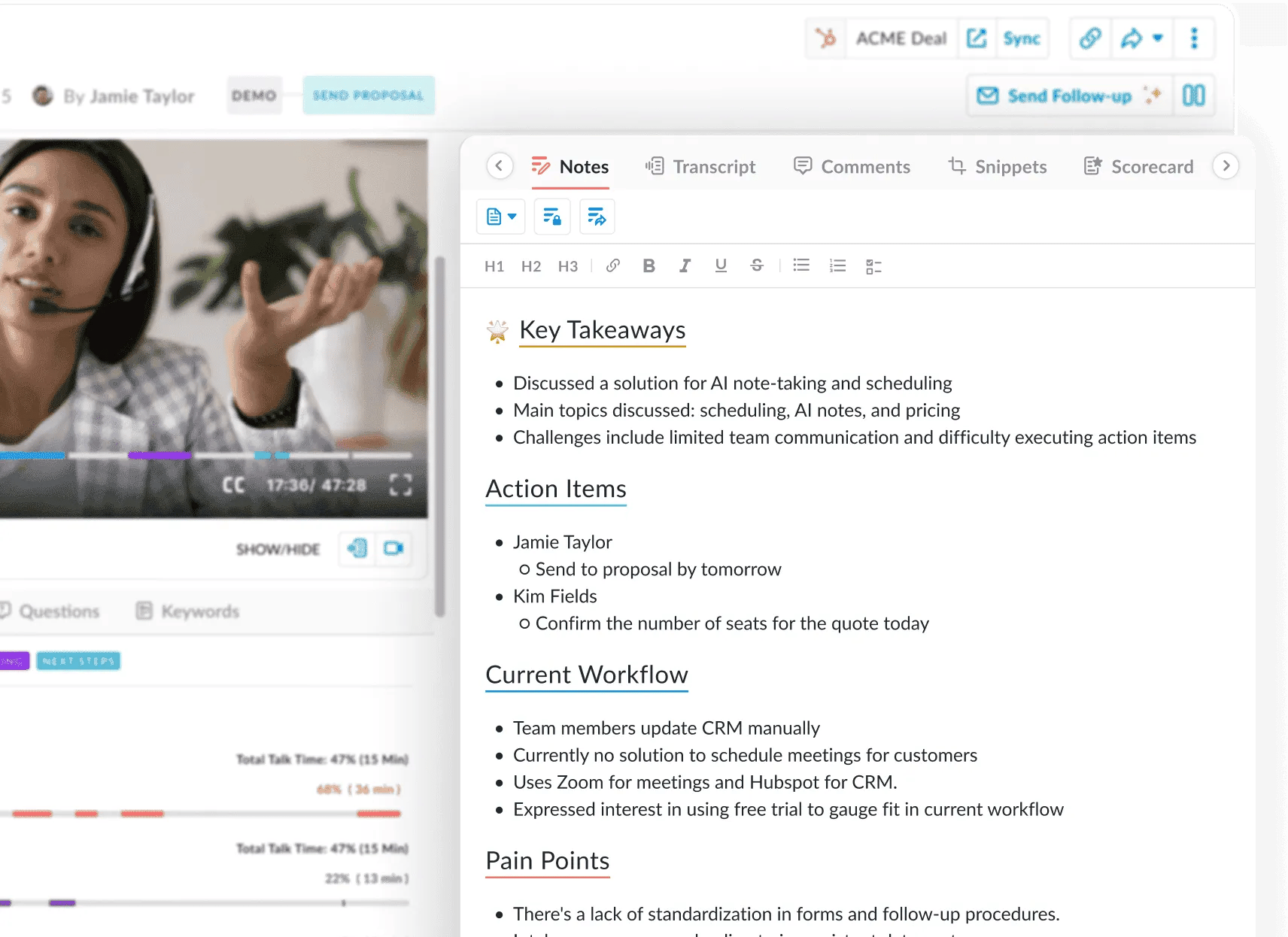
The tool’s standout feature is the live answer assistant. It displays answer cards during the call to teach reps how to handle objections.
For example, if a prospect asks about product integration, Avoma will pop up with information on the integration, including how it works and what you can do. It also includes a link the sales rep can send to the prospect to give them more information.
Other features include:
-
Call analytics that identify the habits and tactics of top performers
-
AI call scoring that generates customizable AI scorecards
-
Smart trackers that proactively find deal risks, churn signals and product feedback
Avoma integrates with CRMs, conferencing software and dialers. It has over 1,000 integrations, including one for Pipedrive.
Avoma’s conversation intelligence tool costs $69 per user per month. There’s also a free trial.
5. Aircall AI: best for call scoring
Aircall is an AI-powered customer communications platform. AI call scoring lets managers quickly evaluate calls using custom scorecards that combine human-evaluated and AI-evaluated questions.
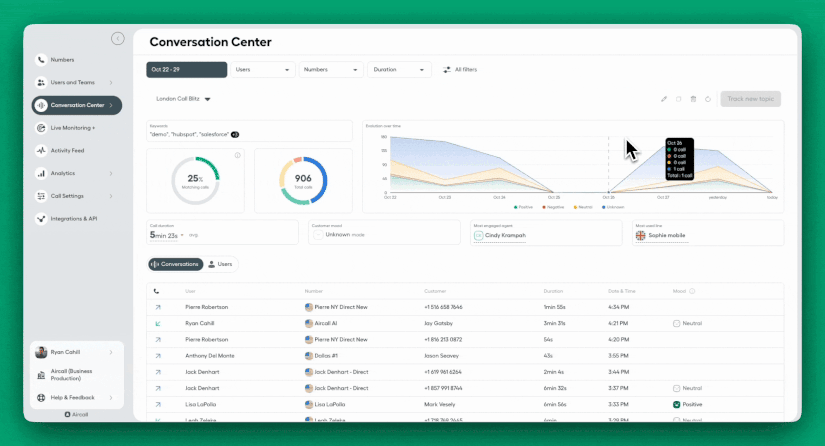
AI automates call evaluations by checking key elements like next-step follow-ups and call summaries. It then condenses hour-long conversations into quick-read reports highlighting key discussion points and outcomes, saving managers significant review time.
Other features include:
-
Customer sentiment analysis that helps coaches focus on calls with a negative outcome
-
Conversation topic tracking that summarizes calls for sales coaches so they know whether they’re worth evaluating
-
Aggregated performance analysis so coaches can see an average score for every rep
Aircall integrates with leading CRMs like Pipedrive and hundreds of other sales tools.
Aircall’s professional plan, which includes AI features, costs $70 per user per month.
Note: Aircall integrates with Pipedrive, letting you access CRM data without leaving the Aircall platform. Calls and SMS conversations log automatically in Pipedrive, too.
What are the benefits of AI sales coaching?
AI overcomes some of the biggest challenges of traditional sales coaching, such as limited one-on-one time and the inability to scale as your team grows.
Here are the advantages small business owners can expect when adopting an AI sales coach.
Cost-effective coaching at scale
AI tools deliver cost-effective sales coaching that scales with your business regardless of how many reps you hire. One AI tool can serve 100 reps just as well as 10.
For example, in a traditional coaching scenario, a sales leader would have to hire a new coach whenever they wanted to increase their team significantly. With AI sales coaching, however, the sales leader can continue to deliver personalized coaching with the same tool. They’ll only need to pay the cost of a new subscription.
Small businesses can compete with larger companies as a result, explains Senior Vice President of the Chamber’s Technology Engagement Center, Jordan Crenshaw:
Improved performance
AI sales coaching targets a rep’s weakest points, providing tailored training that overcomes issues and helps them increase win rates. AI tools can help reps:
-
Practice sales methodology through role-playing
-
Overcome objections by providing real-time advice
-
Focus on the highest value deals by analyzing buyer intent
-
Close more deals by highlighting the next best steps
For example, an AI analyzes all deals in a rep’s pipeline and compares characteristics like industry, deal value and stakeholders to rank open deals by their probability of closing. Reps can then focus on deals with the highest scores, increasing close rates.
Research shows sales teams that combine AI with sales training more than tripled (3.3x) their quota attainment compared to those using AI alone.
Personalized coaching for every rep
AI sales coaching analyzes individual performance data to create custom training programs that target each rep’s specific challenges. The AI coach continuously monitors:
-
Call recordings to identify conversation patterns and sales skills gaps
-
Email metrics to assess communication effectiveness
-
Deal progression rates to spot where reps struggle most
-
Customer feedback to highlight areas for skill development
For example, when the AI notices a rep’s deals frequently stall after sending proposals, it creates focused training on proposal follow-up strategies and timing. Meanwhile, another rep showing strong closing skills but low discovery call success receives targeted coaching on qualification questions and active listening techniques. This automated personalization ensures every rep gets relevant coaching exactly when needed.
Real-time coaching during live calls
AI sales coaching helps reps succeed in the moment by providing real-time guidance during live calls rather than waiting for post-call feedback. The AI assistant actively monitors conversations to:
-
Suggest proven responses to common objections
-
Recommend relevant case studies and social proof
-
Highlight key product features based on customer needs
-
Prompt next steps to move deals forward
For example, when a prospect mentions budget concerns, the AI immediately suggests specific value propositions and ROI data that have worked in similar situations. This real-time support helps reps close more deals by applying winning tactics in the moment instead of learning from mistakes after losing an opportunity.
Consistent coaching on a daily basis
AI sales coaching replaces weekly review sessions with daily, actionable feedback. The AI continuously monitors and provides:
-
Specific performance metrics after each interaction
-
Clear action items based on recent activities
-
Customized practice exercises for improvement
-
Data-driven progress measurements
For example, reps get instant feedback after each conversation instead of waiting for a weekly coaching session to review multiple calls. This immediate guidance helps them adjust their approach for their next call, leading to faster skill improvement.
Recommended reading

How smaller companies are leading the AI revolution
How to successfully implement AI sales coaching
According to Pipedrive’s The State of Sales and Marketing Report 2023/24, small companies (with up to 10 employees) adopt AI faster than large companies (with over 100 employees).
Join them by implementing AI sales coaching using the following steps.
1. Implement a single AI tool first
Start with one comprehensive coaching tool that aligns with your most important sales goals. This focused approach helps reps master the tool quickly and see measurable improvements in their performance.
Here’s how to select an AI coaching tool to address specific sales challenges:
|
Challenge |
Solution |
|
Leaders don’t have enough time |
A personalized coaching tool, like MeetRecord, finds and fix each rep’s unique weaknesses |
|
Reps struggle to overcome objections |
An AI tool that delivers real-time advice and information, like Avoma, helps reps during customer conversations |
|
Teams are unclear on the most effective sales strategy |
A conversational intelligence platform, like Enthu.AI, aggregates team performance and uncovers the most effective strategies |
|
There’s no coaching process in place |
A general all-around coaching aide, like Pipedrive’s Sales Assistant, serves many functions |
These are only recommendations. Find more tools using Google and analyze comparison matrices from review websites like G2.
2. Evaluate AI coaching solutions
Start your evaluation by assessing your current sales coaching challenges and goals. For example, prioritize tools with strong email coaching features if your team struggles with consistent follow-up. If call quality varies widely, focus on platforms with robust conversation analysis.
When reviewing potential solutions, examine these key areas:
|
Feature to evaluate |
What to look for |
|
CRM integration |
Automatic syncing of sales data, activities and contact information |
|
Email platform connection |
Analysis of response rates, content effectiveness and follow-up timing |
|
Call system compatibility |
Recording capabilities, conversation transcription and analysis tools |
|
Real-time coaching features |
Live call assistance, objection-handling suggestions and next-step prompts |
|
Conversation analysis |
Speech pattern recognition, sentiment analysis and best practice identification |
|
Performance tracking |
Customizable dashboards, progress metrics and improvement trends |
|
Coaching parameters |
Ability to align AI coaching with your sales methodology and process |
|
User onboarding |
Self-service training materials, guided setup and implementation support |
|
Technical support |
Response time guarantees, multiple support channels and a knowledge base |
|
Pricing structure |
Team-based pricing, feature tiers and scaling options |
|
Feature updates |
Regular improvements, new capabilities and market-driven enhancements |
|
User management |
Easy team member addition, role customization and permission settings |
Test your shortlisted tools through free trials or demos to evaluate their effectiveness in your sales environment. Pay special attention to user adoption rates and early performance improvements during these trial periods.
3. Prepare your data
AI sales coaching tools need access to high-quality data to deliver tailored coaching, including:
Integrating your AI coaching solution with other tools in your tech stack, such as your CRM, autodialer and sales enablement platform, can increase the amount of data it can access.
Many AI tools will have native integrations with well-known sales solutions. For example, Enthu.AI connects natively with Pipedrive’s CRM, automatically transferring call scores and other information from Enthu.AI to your CRM.
For tools without native integrations, use an automation platform like Zapier to connect two tools. Creating automations this way is as simple as making a trigger event and an action:
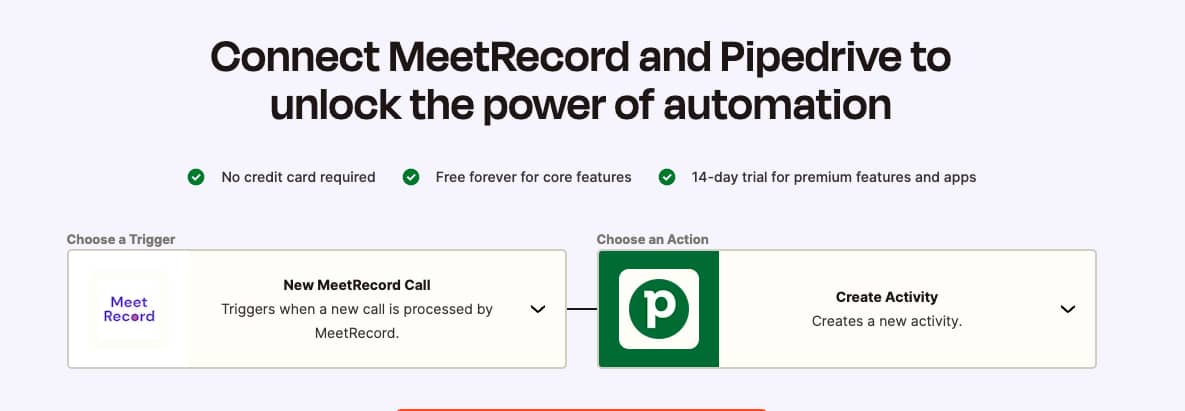
For instance, use Zapier to connect MeetRecord and Pipedrive. Just choose a trigger event (e.g., a new MeetRecord Call) and a corresponding action (e.g., creating an activity event in Pipedrive).
Note: This is for demonstration purposes only. You can find a native integration with MeetRecord on Pipedrive Marketplace.
4. Measure your success
Track sales performance through measurable metrics (e.g., conversion rates and deal values) and gather feedback from your team about their AI coaching experience.
Relevant sales metrics make an excellent quantitative data source. Consider tracking the following sales rep performance metrics:
Your CRM is the best place to find and record this data. In Pipedrive, for example, you can create a customized sales dashboard for all the metrics you want to track.
Here’s how to do it:
-
Head to Insights and click on “Dashboards”
-
Click on the green “+” sign and then “Dashboard”
-
Give your dashboard a name
-
Add reports by dragging and dropping them from the left-hand sidebar (you can have a maximum of 25 reports per dashboard)
-
Use the pencil icon next to each report to move and resize charts
Ask sales reps for feedback. They must enjoy using the platform – otherwise, any performance improvement may be short-lived.
Download Pipedrive’s state of AI in business report 2024
Find out everything about business AI adoption
Final thoughts
AI sales coaching helps sales reps reach their full potential through consistent, personalized training – without adding more managers. The software analyzes each interaction, delivers immediate feedback and helps improve specific skills that increase close rates.
AI coaching capabilities continue to advance, offering increasingly precise guidance for sales conversations. Start improving your team’s performance now by trying Pipedrive’s AI features free for 14 days.
